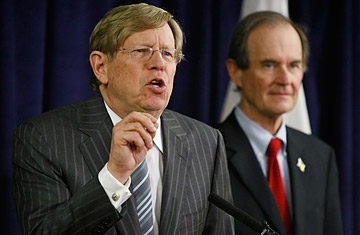
Attorney Theodore Olson, left, speaks in front of attorney David Boies, right, during a news conference in San Francisco on Monday, Jan. 11, 2010
One of the most important — and contentious — civil rights trials in a generation comes to a close June 16, 2010, in a San Francisco courtroom, when lawyers for two gay couples attempt to persuade a federal judge to be the first to rule that the U.S. Constitution guarantees gays and lesbians the right to marry. Their opponents, backed by many of the most powerful religious voices in America, will argue that Californians got it right in 2008 when they voted to make gay marriage unconstitutional in their state.
The stakes couldn't be higher for gay couples in California, who argue that the the referendum that approved what is popularly known as Prop 8 violated their most fundamental right and has rendered them second-class citizens. Meanwhile, defenders of Prop 8 fear that a judgment against them will diminish the role of the traditional family — man, woman and their offspring — as the basic cornerstone of society. Prop 8 added language to the California constitution that expressly limits marriage to the union of one man and one woman.
All those feelings will add to the electricity buzzing around the courtroom midday in California when Ted Olson, the former U.S. Solicitor General and Republican stalwart who shocked his fellow conservatives by bringing the case last year, opens nearly two hours of closing arguments. He'll be followed by Charles Cooper, the Reagan-era Justice Department attorney hired by Prop 8's supporters to defend the initiative.
No ruling is expected today, but already Chief Judge Vaughn Walker, a Republican appointee who is also gay, has tipped his hand at least this much: he's determined to issue a ruling that will be as reversal-proof as possible. Last week, he issued a memo to lawyers on both sides filled with dozens of questions he wants them to be ready to answer when they appear today. They ranged from questions about human sexuality — what legal implications would there be if the evidence at trial proved female sexuality to be more fluid than male? — to questions about the economic impact gay marriage could have on communities. If the opening statements in the case were any indication, he won't hesitate to pepper the lawyers with questions as they attempt to close.
The extra scrutiny could matter a lot. Last week, as he prepared his final argument, Olson told TIME the case is certain to go the U.S. Supreme Court no matter who wins in San Francisco. So what each side will be hoping to win with today's argument is a head start in what will likely be a very long appellate race. And it's a kind of highly intense verbal sparring in which the details could have a big impact, in part because there are so many ways for Walker to rule.
A ruling by Walker in favor of the two gay couples could pave the way for the legalization of gay marriage throughout the U.S. — or it could have a much more limited impact. Walker could rule against Prop 8, for instance, even without giving gay marriage especially strong constitutional protections. He could say the ballot initiative was simply too arbitrary in taking back rights the California Supreme Court had already granted to gay couples there.
Walker asked both sides last week whether, if he strikes down Prop 8, he must also issue a ruling on the constitutionality of the federal Defense of Marriage Act (DOMA), which prevents the U.S. government from recognizing gay marriages even if they are performed in a state where they are legal. Marc Spindelman, a law professor at Ohio State University who has followed the case closely, says Walker doesn't need to address the DOMA statute because there is no federal defendant. However, Walker will face conflicting pressures when deciding how broad to make his ruling.
"If the court rules for the [anti–Prop 8] plaintiffs, the norms of constitutional decision making, backed by the certainty of appellate review, create pressure to issue a narrow ruling," Spindelman tells TIME. But, he adds, "existing legal precedents, backed by the witness of history, might be taken to recommend a broader, more sweeping result. What the judge's questions show is that there are a surprising number of pathways leading to the plaintiff's bottom line that California's marriage amendment violates that U.S. Constitution."
Olson, whose partner in the case is David Boies, the liberal litigator against whom he famously argued the Bush v. Gore case that decided the 2000 presidential election, clearly sees history as being on his clients' side. "All throughout the U.S., people are being denied the right every single day to be treated as decent and honorable citizens of the United States," Olson says. "At some point that has to stop."
Supporters of Prop 8 see history in the making too. "When and where marriage is at stake, there is an entire universe of arguments in play, including those that are explicitly religious and those that are effectively secular," the Rev. Albert Mohler, president of the Southern Baptist Theological Seminary in Louisville, Ky., and a leading intellectual voice in the Southern Baptist Convention, tells TIME. "This is not a simple case of a religious vs. a secular pattern of argument. My concern is with the preservation and perpetuation of marriage as the central institution of human society." With the closing arguments, the arguing in this trial will be essentially over. But consider it a mere respite. Soon enough, there'll be a verdict to argue about — and a new set of court dates.
